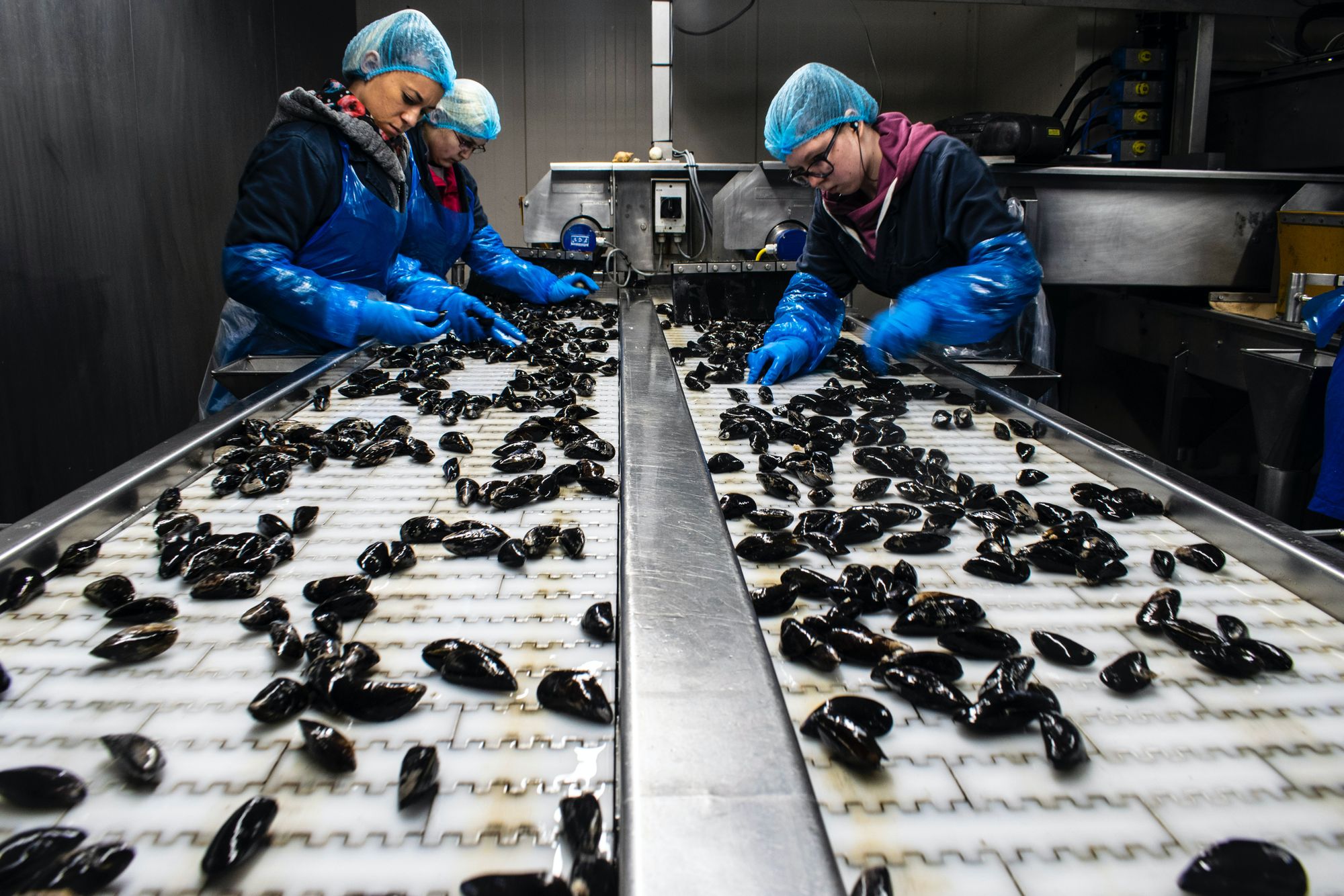The food industry has been rapidly changing in recent years, with new regulations becoming a reality for foods manufacturing. We are now seeing wider definitions of what is considered to be a food product, and stricter guidelines for labeling, packaging and advertising. In this article, we will take a look at the latest regulations that have come into effect, and how they are likely to impact the food industry.
In today’s guide, we’ll cover the latest regulations for food manufacturing and its related concepts. Let’s take a look at the table of content ahead:
- Importance of Regulations in Food Manufacturing
- Why it's Important to Stay Up-to-Date With the Latest Regulations?
- Most Recent Regulations that have Been Put in Place for Food Manufacturing
- Key Changes and Impacts
- Compliance Strategies
- Challenges and Opportunities
- Wrapping Up
- How Deskera Can Assist You?
Let’s get started!
Importance of Regulations in Food Manufacturing
Regulations play a critical role in ensuring the safety and quality of food products manufactured and consumed by people around the world.
These regulations provide guidelines and standards for food manufacturers to follow to ensure that their products are safe, wholesome, and accurately labeled.
Additionally, regulations help to prevent foodborne illnesses, protect public health, and provide consumers with confidence in the food they are purchasing and consuming.
Compliance with these regulations is not only essential for public health and safety but also for the reputation and success of food manufacturing companies.
Why it's Important to Stay Up-to-Date With the Latest Regulations?
Staying up-to-date with the latest regulations is crucial for food manufacturing companies to ensure they remain compliant with legal requirements and avoid potential penalties, recalls, or reputational damage.

Regulations for food manufacturing are constantly evolving due to advances in technology, changes in consumer behavior and preferences, and emerging food safety risks. Failing to stay current with the latest regulations can result in serious consequences, such as product recalls, lawsuits, or fines.
Additionally, companies that fail to comply with regulations risk losing consumer trust and damaging their brand reputation. Thus, staying up-to-date with the latest regulations is essential to ensure that food manufacturing companies are producing safe, high-quality products that meet legal requirements and consumer expectations.
Most Recent Regulations that have Been Put in Place for Food Manufacturing
There have been several recent regulations implemented in the food manufacturing industry. Some of the most significant regulations include:
Food Safety Modernization Act (FSMA):
This is a comprehensive set of regulations that aim to prevent foodborne illnesses and improve food safety across the food supply chain. It requires food manufacturers to implement a Hazard Analysis and Risk-Based Preventive Controls (HARPC) plan to identify and address potential hazards, and to establish a supply-chain program to verify the safety of raw materials and ingredients.
Nutrition Facts Labeling:
The FDA updated the Nutrition Facts Label requirements in 2016 to make it easier for consumers to make informed decisions about the foods they consume. The new label includes information on added sugars, updated serving sizes, and updated daily value percentages.
Food Allergen Labeling and Consumer Protection Act (FALCPA):
This regulation requires food manufacturers to clearly and accurately label food products that contain any of the eight major food allergens, including milk, eggs, fish, shellfish, tree nuts, peanuts, wheat, and soybeans.
Foreign Supplier Verification Program (FSVP):
This regulation requires importers to verify that their foreign suppliers meet U.S. food safety standards to ensure that imported food products are safe for consumption.
Preventive Controls for Animal Food:
This regulation applies to animal food manufacturers and requires them to implement preventive controls to ensure the safety of their products.
These regulations are just a few examples of the latest regulations in food manufacturing. It is essential for food manufacturers to stay up-to-date with these regulations to ensure compliance and maintain the safety and quality of their products.
Importance of complying with these regulations:
Compliance with these regulations is essential for food manufacturers to protect public health, prevent foodborne illnesses, and avoid potential legal, financial, and reputational risks.
Failure to comply with regulations can lead to serious consequences, such as product recalls, lawsuits, fines, and damage to brand reputation.
In addition, compliance with regulations can help food manufacturers establish and maintain consumer trust, improve product quality, and promote their brand reputation. Thus, it is important for food manufacturers to stay up-to-date with the latest regulations and comply with them to ensure the safety and quality of their products.
Key Changes and Impacts
Key Changes that these regulations have brought about:
The recent regulations in food manufacturing have brought about significant changes in the industry. For example, the Food Safety Modernization Act (FSMA) has required food manufacturers to implement a Hazard Analysis and Risk-Based Preventive Controls (HARPC) plan, which involves identifying potential hazards and implementing preventive measures.
This has led to changes in manufacturing processes, such as increased monitoring and record-keeping, as well as changes in supply chain management to ensure the safety of raw materials and ingredients.
The updated Nutrition Facts Labeling regulation has required food manufacturers to include additional information on the label, such as added sugars and updated serving sizes, which has led to changes in product formulation and packaging. The Food Allergen Labeling and Consumer Protection Act (FALCPA) has required food manufacturers to clearly label foods that contain major allergens, leading to changes in product formulations and labeling.
The Foreign Supplier Verification Program (FSVP) has required importers to verify that their foreign suppliers meet U.S. safety standards, leading to changes in supplier relationships and increased monitoring of imported food products.
The Preventive Controls for Animal Food regulation has required animal food manufacturers to implement preventive controls to ensure the safety of their products, leading to changes in manufacturing processes and product formulations.
Discussion of how these changes are impacting the food manufacturing industry:
The changes brought about by these regulations have had a significant impact on the food manufacturing industry. Food manufacturers have had to make changes to their processes, formulations, and labeling practices to comply with the new regulations. This further has led to increased costs and operational challenges, as well as the need for increased training and education for employees.
However, these changes have also led to improvements in food safety, transparency, and consumer trust. The regulations have helped to prevent foodborne illnesses, improve the accuracy of labeling, and provide consumers with more information about the food they are purchasing and consuming.
Furthermore, compliance with these regulations has become increasingly important for companies to maintain their reputation and competitive advantage in the market.
Examples of companies that have had to make changes in order to comply with the new regulations:
Many food manufacturing companies have had to make changes in order to comply with the new regulations.
For example, companies such as Nestle and PepsiCo have implemented new processes and procedures to comply with the Food Safety Modernization Act (FSMA).
Coca-Cola and General Mills have updated their labeling practices to comply with the updated Nutrition Facts Labeling regulation.
Companies such as Kraft Heinz and Campbell Soup have updated their product formulations and labeling practices to comply with the Food Allergen Labeling and Consumer Protection Act (FALCPA).
Companies that import food products, such as Walmart and Costco, have had to implement new supply chain management practices to comply with the Foreign Supplier Verification Program (FSVP).
These companies have demonstrated the importance of compliance with the regulations and the potential benefits of doing so.
Compliance Strategies
Overview of the different strategies that companies can use to ensure compliance with the latest regulations:
There are several strategies that food manufacturing companies can use to ensure compliance with the latest regulations:
- Implement a comprehensive compliance program: Companies can implement a comprehensive compliance program that includes policies, procedures, training, and monitoring to ensure that all employees understand and comply with the regulations. This strategy can help companies minimize legal and financial risks associated with non-compliance.
- Conduct regular audits and assessments: Companies can conduct regular internal audits and assessments to identify potential compliance issues and ensure that they are meeting regulatory requirements. This strategy can help companies identify and address compliance issues proactively, before they become bigger problems.
- Partner with third-party compliance experts: Companies can partner with third-party compliance experts who have expertise in the latest regulations and can provide guidance and support to ensure compliance. This strategy can help companies stay up-to-date with the latest regulations and best practices.
- Utilize technology solutions: Companies can utilize technology solutions such as automated monitoring systems or compliance software to help manage compliance with the latest regulations. This strategy can help companies streamline compliance efforts and reduce the risk of human error.
Explanation of the benefits and drawbacks of each strategy:
Each compliance strategy has its benefits and drawbacks. Implementing a comprehensive compliance program can help companies ensure that all employees understand and comply with regulations, which can minimize legal and financial risks. However, this strategy can be time-consuming and expensive to implement.
Furthermore, conducting regular audits and assessments can help companies identify potential compliance issues and address them proactively. However, this strategy can be resource-intensive and may not be as effective in identifying all potential compliance issues.
Furthermore, partnering with third-party compliance experts can provide companies with expertise and guidance to ensure compliance. However, this strategy can be expensive and may not provide the same level of understanding of the company's operations as an internal compliance program.
Utilizing technology solutions can help companies streamline compliance efforts and reduce the risk of human error. However, this strategy can be expensive to implement and may not be suitable for all companies.
Examples of companies that have successfully implemented compliance strategies:
Many companies have successfully implemented compliance strategies to ensure compliance with the latest regulations. For example, Hershey's has implemented a comprehensive compliance program that includes training and monitoring to ensure compliance with the Food Safety Modernization Act (FSMA). The company has also partnered with third-party experts to help ensure compliance with the latest regulations.
Nestle has conducted regular internal audits and assessments to identify potential compliance issues and ensure compliance with the latest regulations. The company has also utilized technology solutions to help manage compliance efforts and reduce the risk of human error.
Coca-Cola has partnered with third-party experts to help ensure compliance with the updated Nutrition Facts Labeling regulation. The company has also implemented a comprehensive compliance program that includes training and monitoring to ensure compliance with the latest regulations.
These examples demonstrate the importance of compliance strategies in ensuring compliance with the latest regulations and the benefits of each strategy.
Challenges and Opportunities
Discussion of the challenges that companies face in complying with the latest regulations:
Complying with the latest regulations can be challenging for companies. Some of the challenges include:
Increased costs: Compliance with the latest regulations can be expensive, as companies may need to invest in new equipment, technology, and training to ensure compliance.
Operational changes: Complying with the latest regulations may require significant operational changes, such as modifying production processes or sourcing new ingredients, which can be disruptive to existing operations.
Regulatory complexity: The latest regulations can be complex and difficult to interpret, making it challenging for companies to understand what is required to achieve compliance.
Enforcement: Failure to comply with the latest regulations can result in significant penalties, including fines and reputational damage.
Explanation of the opportunities that these challenges present:
While compliance with the latest regulations presents challenges, it also presents opportunities for companies. Some of these opportunities include:
Improved safety and quality: Compliance with the latest regulations can lead to improved safety and quality of products, which can enhance customer trust and satisfaction.
Innovation: Companies may need to invest in new equipment, technology, and ingredients to comply with the latest regulations, which can lead to innovative manufacturing and new product development.
Competitive advantage: Companies that comply with the latest regulations may have a competitive advantage over those that do not, as customers may prefer to purchase products from companies that prioritize safety and compliance.
Reputation: Compliance with the latest regulations can enhance a company's reputation as a responsible and trustworthy business.
Examples of companies that have turned challenges into opportunities:
Many companies have successfully turned compliance challenges into opportunities. For example, Tyson Foods invested in new equipment and technology to comply with the FSMA regulations, which led to improved food safety and quality. This investment also led to the development of new products and processes that improved operational efficiency and reduced costs.
Similarly, Nestle invested in new technology to comply with the latest regulations for product labeling. This investment not only ensured compliance but also provided an opportunity to enhance the customer experience by providing more accurate and transparent information about its products.
Ultimately, while following the most recent regulations presents challenges for companies that produce food, it also presents opportunities for innovation, improved safety and quality, and competitive advantage.
Furthermore, by making compliance a top priority and investing in solutions to assure compliance, businesses may turn these challenges into opportunities and enhance their entire business performance.
Wrapping Up
In conclusion, staying up-to-date with the latest regulations is crucial for any food manufacturer.
It is important to understand the regulatory landscape and comply with the relevant regulations to ensure the safety and quality of food products. The regulations discussed in this article highlight the growing importance of transparency and traceability in the food supply chain. Manufacturers must be proactive in implementing these regulations and ensuring compliance to maintain consumer trust and protect public health.
By staying informed and following best practices, food manufacturers can continue to meet regulatory standards and deliver safe, high-quality products to consumers.
How Deskera Can Assist You?
Deskera's integrated financial planning tools allow investors to better plan their investments and track their progress. It can help investors make decisions faster and more accurately.
Deskera Books enables you to manage your accounts and finances more effectively. Maintain sound accounting practices by automating accounting operations such as billing, invoicing, and payment processing.

Deskera CRM is a strong solution that manages your sales and assists you in closing agreements quickly. It not only allows you to do critical duties such as lead generation via email, but it also provides you with a comprehensive view of your sales funnel.
Deskera People is a simple tool for taking control of your human resource management functions. The technology not only speeds up payroll processing but also allows you to manage all other activities such as overtime, benefits, bonuses, training programs, and much more. This is your chance to grow your business, increase earnings, and improve the efficiency of the entire production process.
Final Takeaways
We've arrived at the last section of this guide. Let's have a look at some of the most important points to remember:
- Regulations play a critical role in ensuring the safety and quality of food products manufactured and consumed by people around the world. These regulations provide guidelines and standards for food manufacturers to follow to ensure that their products are safe, wholesome, and accurately labeled.
- Regulations for food manufacturing are constantly evolving due to advances in technology, changes in consumer behavior and preferences, and emerging food safety risks. Failing to stay current with the latest regulations can result in serious consequences, such as product recalls, lawsuits, or fines.
- The FDA updated the Nutrition Facts Label requirements in 2016 to make it easier for consumers to make informed decisions about the foods they consume. The new label includes information on added sugars, updated serving sizes, and updated daily value percentages.
- The recent regulations in food manufacturing have brought about significant changes in the industry. For example, the Food Safety Modernization Act (FSMA) has required food manufacturers to implement a Hazard Analysis and Risk-Based Preventive Controls (HARPC) plan, which involves identifying potential hazards and implementing preventive measures.
- Companies can partner with third-party compliance experts who have expertise in the latest regulations and can provide guidance and support to ensure compliance. This strategy can help companies stay up-to-date with the latest regulations and best practices.
- Utilizing technology solutions can help companies streamline compliance efforts and reduce the risk of human error. However, this strategy can be expensive to implement and may not be suitable for all companies.
- Complying with the latest regulations may require significant operational changes, such as modifying production processes or sourcing new ingredients, which can be disruptive to existing operations.
Related Articles













